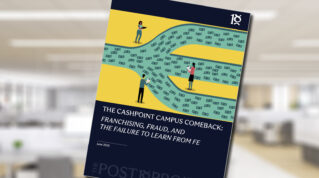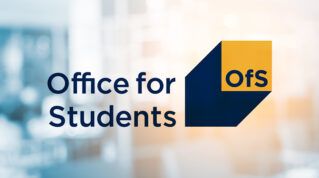Plans to deny student loans to pupils who fail their English and maths GCSEs could deprive around one in four disadvantaged learners of a higher education place, the Institute for Fiscal Studies has warned.
Setting a minimum GCSE threshold for student finance would also have excluded almost one in 10 entrants to education degree courses in the middle of the last decade.
It comes after the government’s own equality analysis concluded students with certain protected characteristics, such as those from black and ethnic minority groups and those with SEND, were “likely to be disproportionately impacted” by the proposed changes.
The think tank analysed the potential impact government proposals would have had on students who sat their GCSEs in 2011 and 2012. They focused on these cohorts so they could observe their degree outcomes.
The analysis found that almost one in four undergraduates from those cohorts who were eligible for free school meals at the age of 16 would not have been able to access student loans if a GCSE English and maths requirement was in place.
This compares to 9 per cent of state school pupils not eligible for free school meals, and just 5 per cent of private school pupils.
Bigger impact on black, Bangladeshi and Pakistani students
The analysis also found a GCSE requirement would have a “much bigger impact” on participation by black, Bangladeshi and Pakistani students than on white British students.
While around 7 per cent of white British undergraduates would have been affected, 18 per cent of Bangladeshi and Pakistani students would have been hit, and 23 per cent of black undergraduates.
The impact would be smaller if the requirement was two Es at A-level, rather than passes at GCSE, the IfS found. For example, an A-level threshold would affect only 5 per cent of undergraduates previously eligible for free school meals, while a GCSE threshold would affect 23 per cent.
The government says its reforms, set out in its response to the Augar Review of post-18 education, would “ensure students aren’t being pushed into higher education before they are ready”.
Most lower-attainers still graduate
A consultation has asked for views on making access to student finance dependent on having either two Es at A-level or at least a grade 4 in English and maths GCSE.
The IfS did find that students who did not achieve the minimum qualifications at school had worse degree outcomes than their peers. But it also found that close to 80 per cent still graduate, with around 40 per cent doing so with a first or upper second class degree.
The think tank also warned that a GCSE threshold would have excluded around 9 per cent of entrants to education courses from obtaining student loans.
A DfE spokesperson said no final decisions had been made about reforms.
“Evidence shows that students with lower prior attainment are less likely to complete their degree and get a ‘good’ classification, and more likely to have worse employment and degree outcomes.
“The aim of minimum eligibility requirements is to make sure that only those who will benefit from it, go on to study at degree level, regardless of their background.”

















There seems to be a common assumption in research and analysis that the impact of taking on student debt is felt evenly across society (it isn’t) and that having equality of access will result in equality of gain (it doesn’t).
To grossly pigeon hole sections of society:
The very wealthy don’t need to take on loans and are therefore, on average, immediately at a numerical advantage to those less well off.
The middle take loans but some, over the course of their lives, probably get some financial help by other means (parents help, inheritance etc). They are at a disadvantage to the wealthy but better off than the disadvantaged.
The most disadvantaged would have to take loans, very few have safety nets and the game is further stacked against them (think higher interest from poorer credit ratings, higher energy tariffs, more time wasted banging their heads against the brick wall of bureaucracy etc).
However unpalatable it sounds a vocational route is likely to be a better long term financial choice for the more disadvantaged in the way the current system operates. In a loans driven system, by pushing for equality of access and focusing largely on the benefits (ie potential income gain) and ignoring the disproportionate impact of the debt, it’s probably doing more harm than good. It’s certainly a factor in the growing wealth gap.
The further irony is that higher proportions of disadvantaged people have lower maths ability for a whole host of reasons and are not in the best position to make sound financial decisions.
The real issue here isn’t about equality in accessing loans, it’s about the inequal impact of having an increasingly loans based system.
The IfS has the principal aim of informing fiscal policy of which loans income will form part, their concerns of inequality of access to loans arguably does not come from considering what is best for individuals, but what is best for the balance sheet.
“The IfS did find that students who did not achieve the minimum qualifications at school had worse degree outcomes than their peers. But it also found that close to 80 per cent still graduate, with around 40 per cent doing so with a first or upper second class degree.”
The above is cherry picking stats as it avoids considering the rampant grade inflation that has been going on in degrees. It also avoids showing the graduation gap between disadvantaged and non. It seems reasonable to ask why should the disadvantaged pay the same fee if they have a lower probability of a good grade… therefore reform is valid.
Back in 2010 the Browne review “Securing a Sustainable Future for Higher Education” recommended the removal of the £3,290 annual cap that universities could charge. It didn’t take long before that was £9,000 per year.
What is one of the biggest selling points of degrees for an institution… the likelihood of graduation and the benefits that might bring. Given that Uni’s decide the grades what happens when lots of money is on offer?
2010/11 – 16% got firsts, 67% a 2:1 or better
2016/17 – 27% got firsts, 78% a 2:1 or better
This led the Government, in 2019, to threaten Uni’s with a £500k fine to end grade inflation. Essentially an empty threat as by then pretty much everyone who took a degree would pass and there are enough moving parts to defend against accusation.
(and lets not forget the pay awards University chancellors negotiated along the way)
The IfS pointing out that 80% of disadvantaged people go on graduate, as a stand alone statistic, seems a little misleading given the context.
The recent Gov estimate that only 25% will pay back their loan in full is helpful in gauging the value of a degree. Perhaps splitting that by advantage / disadvantage would be a useful comparator.
People need good well balanced information, not being told what is good for them or herded / farmed.